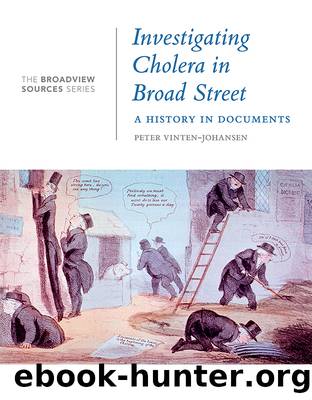Investigating Cholera in Broad Street: A History in Documents: (From the Broadview Sources Series) by Peter Vinten-Johansen

Author:Peter Vinten-Johansen [Vinten-Johansen, Peter]
Language: eng
Format: epub
ISBN: 9781554813940
Goodreads: 48857168
Publisher: Broadview Press Inc
Published: 2020-05-19T00:00:00+00:00
DOCUMENT 12:
Casting a Wider Net: Excerpts from Meetings of the Epidemiological Society of London (1850â51)
The Epidemiological Society of London owes its foundation in 1850 to an unlicensed apothecary. John Hodges Tucker had completed an apprenticeship and opened a practice when passage of the 1815 Apothecaries Act required that future candidates complete a systematic plan of medical lectures, hospital attendance, and examinations for certification as Licentiate of the Society of Apothecaries. However, the Act made exceptions for currently practicing apothecaries such as Tucker.
When cholera progressed through European Russia during the second pandemic, Tucker wondered why the profession had yet to agree on efficacious treatments for this epidemic disease. Two pseudonymous letters published in the Lancet fell on deaf ears. Tucker changed tack. In September 1849, he proposed the creation of a society to investigate epidemic diseases. Several medical men responded to this appeal, created an organizing committee, and solicited potential members. Formal establishment occurred at a meeting in July 1850.11
During its first session, the society held nine monthly meetings. Paper topics included Asiatic cholera (three papers), yellow fever, epidemic mental diseases of children, medical statistics, and âgermsâ of epidemic diseases as possible cause of propagation. Discussions, often extensive and carrying over to the next meeting, followed each paper. In its first year, the societyâs managing council established special committees to investigate smallpox and vaccination, possible correlations between conditions in common lodging houses and the propagation of epidemic diseases, epidemic diseases in public hospitals, and epizootic outbreaks among domestic animals.12
epidemic mental diseases of children: The author of the paper argued that young children are particularly susceptible to imitating adults. He cited epidemic expressions of imitative behavior during the thirteenth-century crusades, witchcraft crazes, and a convulsive âepidemicâ in an Amsterdam orphan asylum.
epizootic: Temporary outbreaks of epidemic disease among animals.
Download
This site does not store any files on its server. We only index and link to content provided by other sites. Please contact the content providers to delete copyright contents if any and email us, we'll remove relevant links or contents immediately.
Room 212 by Kate Stewart(5105)
The Crown by Robert Lacey(4807)
Endurance: Shackleton's Incredible Voyage by Alfred Lansing(4769)
The Iron Duke by The Iron Duke(4349)
The Rape of Nanking by Iris Chang(4203)
Joan of Arc by Mary Gordon(4101)
Killing England by Bill O'Reilly(3995)
Say Nothing by Patrick Radden Keefe(3975)
I'll Give You the Sun by Jandy Nelson(3428)
Shadow of Night by Deborah Harkness(3360)
Hitler's Monsters by Eric Kurlander(3328)
Mary, Queen of Scots, and the Murder of Lord Darnley by Alison Weir(3202)
Blood and Sand by Alex Von Tunzelmann(3195)
Eleanor & Park by Rainbow Rowell(3153)
Darkest Hour by Anthony McCarten(3119)
Margaret Thatcher: The Autobiography by Thatcher Margaret(3079)
Book of Life by Deborah Harkness(2931)
Red Famine: Stalin's War on Ukraine by Anne Applebaum(2928)
The One Memory of Flora Banks by Emily Barr(2857)
